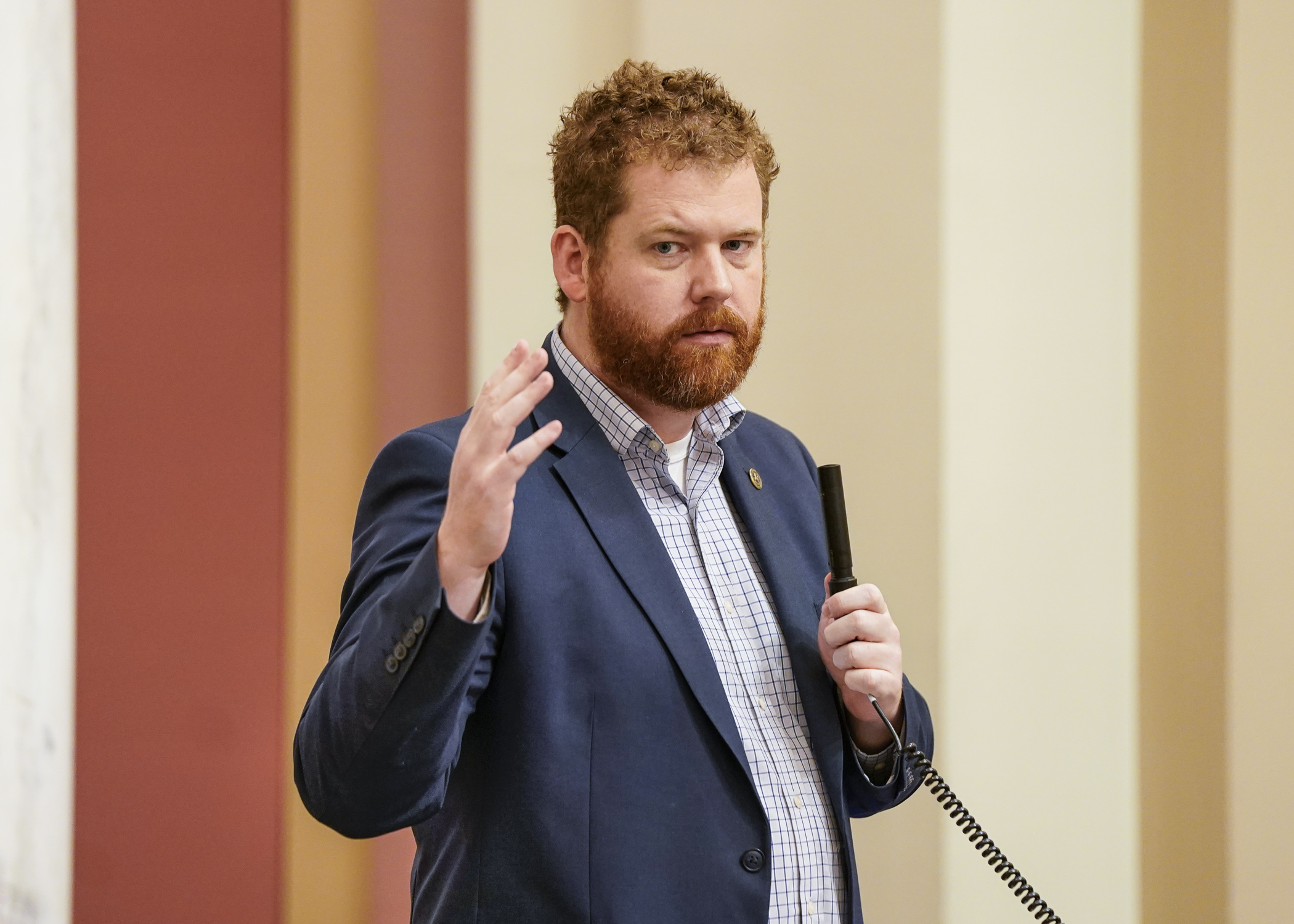House passes $64.2 million omnibus commerce finance bill

The Department of Commerce oversees more than 40 industry areas in Minnesota and licenses more than 250,000 professionals and businesses to ensure that their services and products are fair, accessible, and comply with state laws.
To operate those programs in the upcoming 2024-25 biennium, the omnibus commerce finance and policy bill would appropriate $64.2 million from the General Fund.
Rep. Zack Stephenson (DFL-Coon Rapids), who sponsors HF2680/SF2744*, said the money would allow the department to continue providing critical services to both consumers and businesses across Minnesota.
The House passed the bill, as amended, 70-58 Thursday. Because the House inserted language from its bill into SF2744, a conference committee to iron out the differences with the Senate version is expected. The Senate passed its version 35-32 April 14.
Stephenson singled out several consumer-protection provisions in the bill, including one that would put a 36% cap on the interest rate payday loan companies could charge. “We are going to end the terrible and predatory practice of payday lending in Minnesota.”
Republicans call the bill overreach and out of line with the issues most important to people in the state, and harmful to small businesses.
“It’s a bill that’s chock full of litigation traps for Minnesota businesses, new private rights of action … and unconstitutional provisions that will be challenged in court,” said Rep. Harry Niska (R-Ramsey).
The total $64.2 million appropriation in the bill does not include a $229.5 million temporary appropriation in fiscal year 2025, transferred from the General Fund to the premium security plan account, the state’s reinsurance program to subsidize premiums and increase affordability of health insurance in Minnesota’s individual health insurance market.
Those funds would not directly fund the department, and the bill specifies that they be redistributed by fiscal year 2026.
[MORE: View the spreadsheet]
Policy provisions
Stephenson said the bill proposes changing dozens of state laws that would make Minnesota an even better state to live.
He touted a provision that would establish a Prescription Drug Affordability Board to identify when a drug company makes an excessive price increase: a 15% increase in a wholesale price in a preceding calendar year or a 40% increase over a wholesale price over three immediately preceding years.
“This bill is so critical to tackling the problem of soaring prescription drug prices. No one should have to choose between paying the mortgage and paying for their prescription drugs,” he said.
The attorney general’s office would be empowered to take drug companies to court if they exceed those thresholds. To fund these new duties, the bill would appropriate $1.1 million, and the same amount would be appropriated to create and maintain the Prescription Drug Affordability Board.
A related provision would require health plans to limit patient co-pays to no more than $25 per one-month supply for prescription drugs used to treat chronic diseases. Stephenson said it would prevent people from going bankrupt trying to pay for the medications keeping them alive.
Other notable policy provisions in the bill, some with appropriation requests, would:
- appropriate $62,000 for body cameras for Consumer Fraud Bureau agents and $1.6 million to hire five additional agents;
- prohibit lenders from collecting on loans made under coercion by a third party, such as a domestic abuser;
- enact the “Minnesota Age-Appropriate Design Act” to prevent social media companies from using algorithms that could expose children to harmful information; and
- enact the “Digital Fair Repair Act” to prohibit manufacturers from having exclusive rights to repair their products.
[MORE: Read about the omnibus bill in the House]
Republican amendments
Republicans objections were evident in several amendments they unsuccessfully offered including those that would have:
- deleted a provision to prevent boat insurance contracts from excluding coverage for family members, which Republicans said would open the door to insurance fraud;
- required a study to determine if the actions of the Prescription Drug Affordability Board actually reduce drug prices, and to dissolve the board if it does not; and
- required a study to determine if implementing the Prescription Drug Affordability Board would limit access to prescription drugs in Minnesota and the development of new prescription drugs, then the board would not be established.
Related Articles
Search Session Daily
Advanced Search OptionsPriority Dailies
Legislative leaders set 2026 committee deadlines
By Lisa Kaczke Legislative leaders on Tuesday officially set the timeline for getting bills through the committee process during the upcoming 2026 session.
Here are the three deadlines for...
Legislative leaders on Tuesday officially set the timeline for getting bills through the committee process during the upcoming 2026 session.
Here are the three deadlines for...